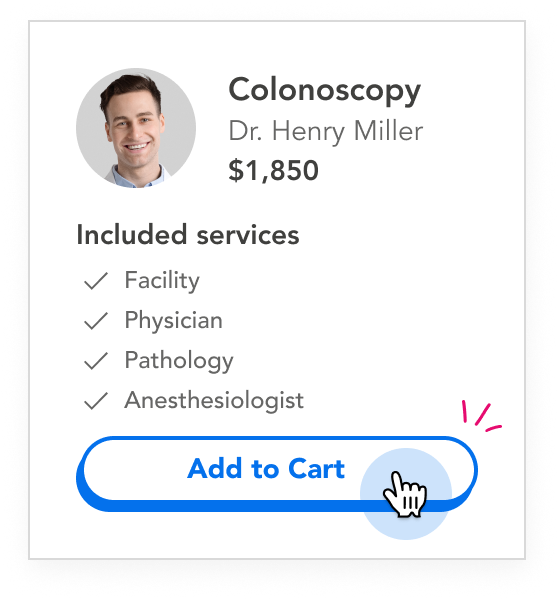Nuclear Stress Test (Myocardial Perfusion Scan) near Marion, IL
Save by purchasing this procedure online.
MDsave Regional Average
This includes a myocardial perfusion SPECT (Single Photon Emission Computed Tomography) test that is used to identify areas of the heart that do not receive enough blood flow. This is done either at rest, during stress (exercise), or both.
On MDsave, the cost of a Nuclear Stress Test (Myocardial Perfusion Scan) near Marion, IL, ranges from $1,909 to $2,553.
MDsave is an online healthcare marketplace where you can buy affordable medical procedures near you at one upfront price.
MDsave is available to anyone paying out-of-pocket and looking to save money on healthcare. No membership fees. No surprise bills.
Learn more about how MDsave works.
Similar Procedures: Myocardial Perfusion Scan (Nuclear Stress Test) (in office)
SORT BY
SELECT A LOCATION
{{ medical_provider_name }}
{{ doc_profile_specialty }}
{{#ratingComponent}}{{address}}
{{location}}
{{/isVideoVisit}}Item added to cart
Commonly Purchased Together
{{ total_price }}
Warning!
You have services from different facilities in your shopping cart. Procedures from different facilities must be purchased in separate orders.
Hello World
Multiple procedures performed during the same visit may qualify for a same session discount.
Get Care In Three Easy Steps
Compare Upfront Prices
Search by procedure and location to browse local providers and compare upfront pricing.

Buy Your Procedure
Pay for your procedure online or by calling (877) 461-2491. Or buy your procedure at the facility before your appointment is scheduled.

Receive Your Care
Follow the scheduling instructions given by your provider. Bring your voucher to your appointment.

Frequently Asked Questions
MDsave is a free-to-use, shoppable marketplace that allows you to compare transparent prices from providers near you and buy the service online. We partner with trusted local providers to offer quality healthcare at upfront, fair prices.
The procedure costs listed are bundled to include all related fees for your procedure. You pay one all-inclusive price with no surprise bills after your appointment. Every procedure is backed by the MDsave Promise: We will refund your payment in full if you do not receive care for your purchased procedure.
MDsave is available to anyone paying out-of-pocket and looking to save money on healthcare. At this time, we do not accept Medicare, Medicaid, or Tricare patients.
Your MDsave purchase may count towards your deductible if you have a high deductible health plan and are not on Medicare, Medicaid, or Tricare. Your insurance company will decide if your purchased procedure is eligible.
To submit your MDsave purchase for consideration to your insurance company, follow these steps.
Don't you know your deductible? Find out using our free deductible checker tool.
We accept Visa, Mastercard, American Express, PayPal, CareCredit, and many health account cards: flexible spending account (FSA), health savings account (HSA), or health reimbursement account (HRA) cards
For more information on payment and financing options, visit our FAQ page.
Patients Love
MDsave
It was a lifesaver. Because MDsave prrovided a cost-effective, very simple option to get an MRI, it was discovered that I have a cancer tumor...I paid 60% less going through MDsave than I would have had to pay for my insurance co-pay.

Robin
from Texas
I felt comfortable knowing that MDsave offers the MDsave Promise—if I purchased the wrong procedure or I didn’t have the procedure completed, MDsave would refund my money 100% back.

Stephanie
from Ohio
My experience with MDsave was amazing. They were and continue to be some of the most helpful medical care people I have ever dealt with. They even helped me by working with my cardiologist to add procedures that I was going to need later.

John
from Oklahoma
It was really easy! From searching my procedure on MDsave.com to printing out the voucher, it was easy and I did it in minutes. The site wasn’t hard to navigate, wasn’t confusing, and it was straightforward. I’m glad MDsave is here to help!

Mike
from Illinois
A nuclear stress test, also known as myocardial perfusion imaging, is a noninvasive test that measures blood flow through the heart, which can also indicate how well the heart is pumping and areas of the heart muscle that are not receiving adequate blood flow.1
The nuclear stress test begins with an injection of a radioactive tracer, a radioactive dye that is absorbed into the heart cells. Once the dye is absorbed, an imaging machine will take pictures of your heart at rest and after exerting yourself.2
Nuclear stress tests use a very low dose of X-rays, but your radiation exposure is quite low and the test is considered safe for most people. Pregnant or nursing mothers should talk to their doctor before having this test, to avoid risk to the baby.3
- A nuclear stress test can be used to help diagnose, monitor, or guide treatment of heart disease:
- Diagnose coronary artery disease (damage or disease of the blood vessels that carry blood, oxygen and nutrients to the heart)
- Determine proper treatment for existing heart disease
- Monitor treatment effectiveness
- Establish safe levels of exercise
- Determine the cause of symptoms (e.g., chest pain, shortness of breath) that more routine tests have failed to uncover 4
Before your appointment:
- Tell your doctor about all medicines you take, including over-the-counter drugs, herbs, vitamins, and supplements. Do not stop taking any medicine unless advised to do so by your doctor.
- Follow all medical advice regarding what you can eat or drink before your appointment. You may be asked to abstain from caffeine for 24 hours prior to your test.
- 4 - 6 hours before your test, you may be asked to avoid eating and drink only water.
- The day of your test, don’t use oil, lotions, or skin creams.5
Bring to your appointment:
- Loose-fitting clothing
- Comfortable shoes you can exercise in
- Your inhaler, if you use one. Let the clinician administering your test know about your inhaler.6
At the beginning of your appointment, your medical team will confirm your medical history, ask you questions about your exercise habits, and check your heart and lungs.
Before the test begins, a technician will inject the radioactive tracer through an intravenous (IV) line placed in your arm. It may feel chilly when first injected, and will take about 20 - 40 minutes to be absorbed. You’ll be asked to lie flat and still on a table while the clinician takes images of the heart at rest.
The next part of the test is an exercise stress test. Sensors called electrodes will be placed on your chest, legs, and arms, where they will monitor the electrical signals that cause your heartbeats. You’ll have a cuff on your arm to measure your blood pressure, and you may be asked to breathe into a tube. The clinician administering your test will monitor your heartbeats, heart rate and blood pressure while you perform an exercise, usually walking on a treadmill or riding an exercise bike.
When your heart rate peaks or reaches a set rate, you will receive another radioactive tracer. After 20 to 40 minutes to allow it to absorb, more images will be taken of your heart, to see how it functions after exertion.7
After the exercise part of your test, you may be asked to stand still for a brief period before lying down. The monitors will remain attached while your heart rate returns to normal. You may need to schedule a follow-up appointment with your doctor to discuss the results.
Unless your doctor tells you otherwise, you should be able to resume your normal routine after the test. Drink plenty of water to help your body will flush the tracer out of your system.8
1,3 American Heart Association, “Myocardial Perfusion Imaging (MPI) Test.” https://www.heart.org/en/health-topics/heart-attack/diagnosing-a-heart-attack/myocardial-perfusion-imaging-mpi-test
2, 4-8 Mayo Clinic, “Nuclear stress test.” https://www.mayoclinic.org/tests-procedures/nuclear-stress-test/about/pac-20385231
